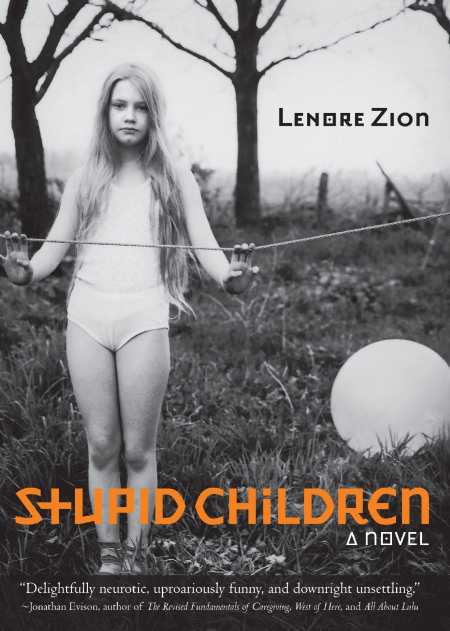
Stupid Children
Growing up is hard. Growing up in a cult is harder, and this is the coming-of-age process that Jane endures in Lenore Zion’s Stupid Children. After her father unsuccessfully attempts suicide, Jane is placed with foster parents who are members of the Second Day Believers, a cult that rids children of “mental impurities” by repeatedly breaking their noses and espouses a plethora of less than logical doctrines. What follows is a hilarious, if disturbing, tale of how Jane survives in this community.
Zion, a doctor of psychology, makes use of her professional knowledge throughout the book. While at times too heavy on the analysis, the narrative is witty and engaging, proof that Zion is adept at handling difficult subject matter. Jane uses her sense of humor to cope with life in the cult, including the odd traditions. She muses, “I still can’t connect the dots from point A to point B in regards to how they might have developed the theory that encasing me inside the carcass of a cow might be beneficial as I advanced into womanhood.”
Along with her sardonic viewpoint, Jane also has moments of surprising insight. She says, “When you stop moving aimlessly in whatever direction feels right at any given moment, you realize you’re a fractured individual with a large hole in your heart, exactly like the deer and moose hanging lifelessly from your foster father’s wall.” She isn’t the only fractured child in the cult; the members have an inordinate number of foster children, most of whom are addicted to drugs and relate to each other in bizarre, dysfunctional ways, if it all.
When Jane’s foster parents bring in a second child, she takes a protective liking to the boy, which changes how she lives among the Second Day Believers. She says, “I had accepted the fact that these people were going to do what they were going to do, and I was powerless, but I could not accept that they would do those same things to this little boy who loved zombies so much and who had already been through enough.” It’s then that Jane has to decide what power she does have and what she’s going to do with it. While not the standard tale of adolescence, this book is relatable just the same, exploring issues of family, belief, society, and friendship, distorted though it all may be.
Reviewed by
Jessica Henkle
Disclosure: This article is not an endorsement, but a review. The publisher of this book provided free copies of the book to have their book reviewed by a professional reviewer. No fee was paid by the publisher for this review. Foreword Reviews only recommends books that we love. Foreword Magazine, Inc. is disclosing this in accordance with the Federal Trade Commission’s 16 CFR, Part 255.
